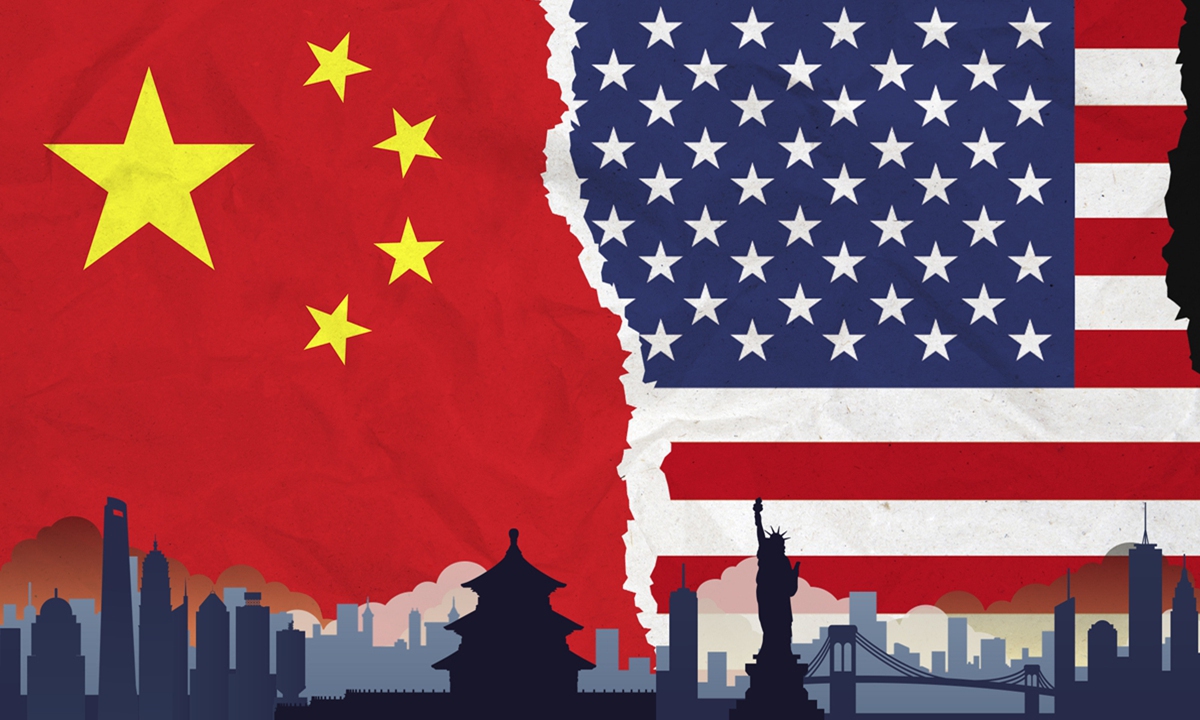US continues 'scapegoating China' tactic at Aspen forum
Hawkish tone prompted by anxiety, 'an attempt to shape solidarity' in polarized US

China-US Graphic: GT
Multiple White House officials have sent messages on US' relations with China - talking in a hawkish tone while alleging to manage the relationship - at the just concluded Aspen Security Forum.
Viewing China as a rival is "political correctness" in the US, forum attendees observed, saying that US political elites found "rivalry with China" is almost the only consensus they can create when they need to display "solidarity" and "cohesion" amid the shadow of a farcical presidential election and a polarizing domestic society.
Although some in the US have claimed to manage relations with China, some Chinese analysts at home are concerned that it may be a tactic to blur the fact that it is the US that initiated and has been escalating the competition with China, and bilateral relations will not see major changes in months before the election.
Hawkish tone
America's national security community made its annual pilgrimage to the mountains of Aspen in Colorado from July 16 to 19 for a gathering notable for a looming feeling of anxiety, the BBC reported, citing the Ukraine crisis, Middle East war, tensions in Asia and its own presidential election.
US Secretary of State Antony Blinken reportedly said Friday that he would meet with Chinese Foreign Minister Wang Yi next week in Laos, as that country hosts senior officials of the Association of Southeast Asian Nations (ASEAN).
Blinken said he speaks with Wang "on a fairly regular basis," which is important for clarifying each country's intentions and avoiding unintended conflicts on topics such as the South China Sea, the Taiwan question and the so-called overcapacity, per a press release on the State Department's website.
Blinken also continued the US' tactic of blaming China for the prolonged Ukraine crisis, as he claimed that China, although not directly giving weapons, is providing inputs for Russia's defense industrial base.
US National Security Adviser Jake Sullivan said at the forum that the US is preparing new sanctions on Chinese entities that the US believes are supporting Russia in the conflict, and hinted that banks may be targeted.
Sullivan also said the US "will do what is necessary" to see that the Philippines is able to resupply its ship, referring to the warship illegally grounded in China's Ren'ai Jiao since 1999. The US has made clear to China that its mutual defense treaty with the Philippines applies to the warship, according to media reports.
US Joint Chiefs of Staff Chairman Gen. Charles Brown claimed at the forum that the US is capable of winning a war against China in case of Taiwan conflict, but that would require "all the nation" to do so and the severity would be like World War II, media reported.
Forum attendee Wang Huiyao, founder and president of think tank the Center for China and Globalization (CCG), told the Global Times on Sunday that his primary impression of the event was that China-related topics frequently appear in the agenda and conversations of attendees, and according to Wang, it is because the US, out of anxiety, probably needs a "rival" to enhance solidarity and cohesion.
As the presidential election looms and divergences widen between and within each party, treating China as a rivalry becomes "one and only consensus," Wang Huiyao said.
The expert also said that US political elites are increasingly blaming China in foreign affairs, including the Ukraine crisis and the Gaza war.
Such strategy is convenient for the US to divert discontent at home and from US allies over Washington's mishandling of those issues, Li Haidong, a professor at the China Foreign Affairs University, told the Global Times on Sunday.
The US utilized the Aspen Security Forum to consolidate and amplify US views and stance, and urge its allies to join the US in its competition with China, Li said, citing Sullivan's remarks as an example.
Chinese Ambassador to the US Xie Feng attended the Aspen Security Forum in July 2023 upon invitation, and had a fireside chat with a senior media professional, where he stated China's overall position on bilateral relations.
Wang Huiyao also noticed when retired military personnel were inclined to talk in a more hawkish tone, some business and think tank representatives who have frequent, up-to-date interactions with China, are able to hold a relatively rational attitude toward China and put a lot of emphasis on the importance of "engagement."
Wang recalled multiple attendees have mentioned the necessity to communicate and cooperate with China on crucial issues, such as AI and climate change. Some also encouraged more American students to visit and study in China.
Since hope of the China-US relationship lies in the people, its foundation is in grassroots connections, Wang Huiyao suggested that China should provide visa convenience similar to the policy for some European countries to encourage Americans to come to visit and see the real China, contributing to mutual understanding and bilateral cooperation.
Meaningful engagement needed
Li said that China has always been responsible in handling its relations with the US, the most consequential bilateral relationship in the world, and the two countries also shoulder shared responsibilities for the world facing major global challenges.
China is always open to meaningful talks to manage differences and avoid conflicts, but observers believe China-US relations are unlikely to see major changes in the following months due to the uncertainty in US politics.
Blinken's reported meeting with Wang Yi in Laos, which has not been confirmed by China, can be an opportunity for the two sides to maintain engagement, but those incumbent officials' hawkish remarks at the Aspen security forum suggest Washington's "management" is lip deep, experts said.
The US is putting on a "responsible posture" to blur the reality that it is the US that initiated the competition, and even rivalry, Li noted.
The presidential election would fuel anti-China sentiments in American political circle, but major changes are unlikely to occur in following months when the US is busy with its domestic politics.
China has meanwhile retained strategic composure, Li said, since who will be the next US president remains uncertain, China is slowing down its pace of engagement to observe the US elections and its impact on China-US relations.

